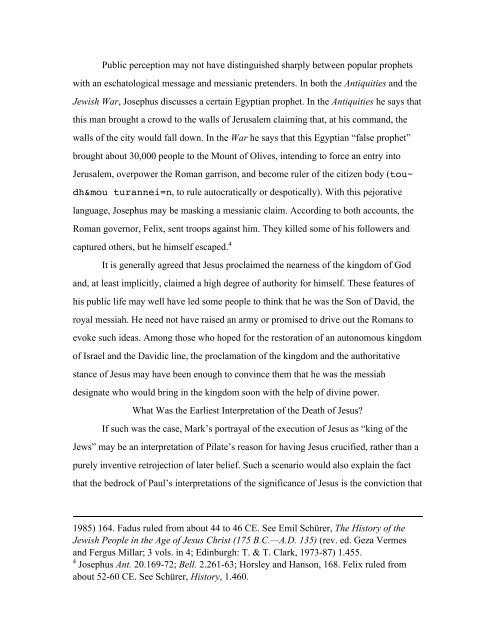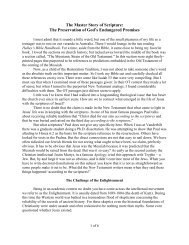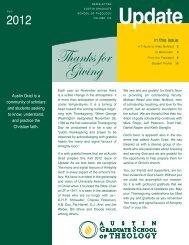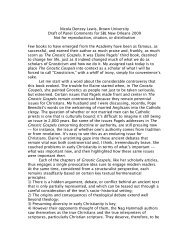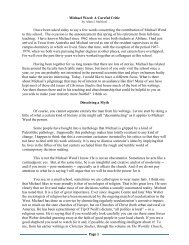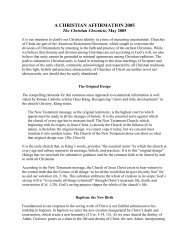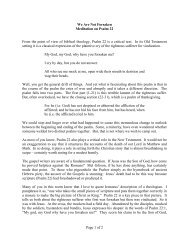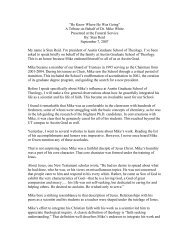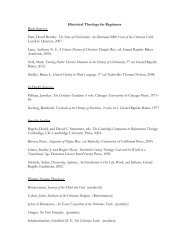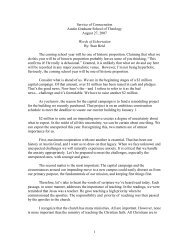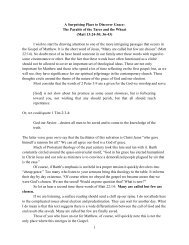The Passion Narrative before and after Mark Adela Yarbro Collins ...
The Passion Narrative before and after Mark Adela Yarbro Collins ...
The Passion Narrative before and after Mark Adela Yarbro Collins ...
You also want an ePaper? Increase the reach of your titles
YUMPU automatically turns print PDFs into web optimized ePapers that Google loves.
Public perception may not have distinguished sharply between popular prophets<br />
with an eschatological message <strong>and</strong> messianic pretenders. In both the Antiquities <strong>and</strong> the<br />
Jewish War, Josephus discusses a certain Egyptian prophet. In the Antiquities he says that<br />
this man brought a crowd to the walls of Jerusalem claiming that, at his comm<strong>and</strong>, the<br />
walls of the city would fall down. In the War he says that this Egyptian “false prophet”<br />
brought about 30,000 people to the Mount of Olives, intending to force an entry into<br />
Jerusalem, overpower the Roman garrison, <strong>and</strong> become ruler of the citizen body (tou~<br />
dh&mou turannei=n, to rule autocratically or despotically). With this pejorative<br />
language, Josephus may be masking a messianic claim. According to both accounts, the<br />
Roman governor, Felix, sent troops against him. <strong>The</strong>y killed some of his followers <strong>and</strong><br />
captured others, but he himself escaped. 4<br />
It is generally agreed that Jesus proclaimed the nearness of the kingdom of God<br />
<strong>and</strong>, at least implicitly, claimed a high degree of authority for himself. <strong>The</strong>se features of<br />
his public life may well have led some people to think that he was the Son of David, the<br />
royal messiah. He need not have raised an army or promised to drive out the Romans to<br />
evoke such ideas. Among those who hoped for the restoration of an autonomous kingdom<br />
of Israel <strong>and</strong> the Davidic line, the proclamation of the kingdom <strong>and</strong> the authoritative<br />
stance of Jesus may have been enough to convince them that he was the messiah<br />
designate who would bring in the kingdom soon with the help of divine power.<br />
What Was the Earliest Interpretation of the Death of Jesus?<br />
If such was the case, <strong>Mark</strong>’s portrayal of the execution of Jesus as “king of the<br />
Jews” may be an interpretation of Pilate’s reason for having Jesus crucified, rather than a<br />
purely inventive retrojection of later belief. Such a scenario would also explain the fact<br />
that the bedrock of Paul’s interpretations of the significance of Jesus is the conviction that<br />
1985) 164. Fadus ruled from about 44 to 46 CE. See Emil Schürer, <strong>The</strong> History of the<br />
Jewish People in the Age of Jesus Christ (175 B.C.—A.D. 135) (rev. ed. Geza Vermes<br />
<strong>and</strong> Fergus Millar; 3 vols. in 4; Edinburgh: T. & T. Clark, 1973-87) 1.455.<br />
4 Josephus Ant. 20.169-72; Bell. 2.261-63; Horsley <strong>and</strong> Hanson, 168. Felix ruled from<br />
about 52-60 CE. See Schürer, History, 1.460.


